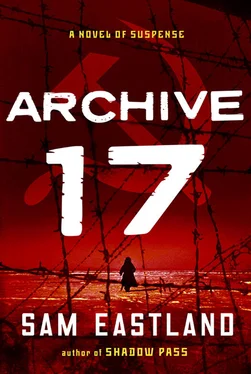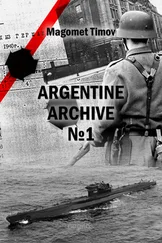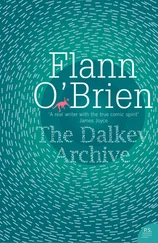Sam Eastland - Archive 17
Здесь есть возможность читать онлайн «Sam Eastland - Archive 17» весь текст электронной книги совершенно бесплатно (целиком полную версию без сокращений). В некоторых случаях можно слушать аудио, скачать через торрент в формате fb2 и присутствует краткое содержание. Жанр: Исторический детектив, на английском языке. Описание произведения, (предисловие) а так же отзывы посетителей доступны на портале библиотеки ЛибКат.
- Название:Archive 17
- Автор:
- Жанр:
- Год:неизвестен
- ISBN:нет данных
- Рейтинг книги:3 / 5. Голосов: 1
-
Избранное:Добавить в избранное
- Отзывы:
-
Ваша оценка:
- 60
- 1
- 2
- 3
- 4
- 5
Archive 17: краткое содержание, описание и аннотация
Предлагаем к чтению аннотацию, описание, краткое содержание или предисловие (зависит от того, что написал сам автор книги «Archive 17»). Если вы не нашли необходимую информацию о книге — напишите в комментариях, мы постараемся отыскать её.
Archive 17 — читать онлайн бесплатно полную книгу (весь текст) целиком
Ниже представлен текст книги, разбитый по страницам. Система сохранения места последней прочитанной страницы, позволяет с удобством читать онлайн бесплатно книгу «Archive 17», без необходимости каждый раз заново искать на чём Вы остановились. Поставьте закладку, и сможете в любой момент перейти на страницу, на которой закончили чтение.
Интервал:
Закладка:
Now another possibility occurred to Pekkala. Perhaps the prisoners had not dug their way out, after all. Maybe they didn’t need to. Is it possible, he wondered, that in their years of toiling in the bowels of the earth, the Comitati had discovered some naturally occurring cave network which provided them with an exit into the forest, somewhere outside the walls of Borodok? Pekkala remembered stories he had heard about the caves of Altamira in northern Spain where, in 1879, a girl walking her dog had stumbled upon the entrance to a system of connecting caverns that stretched deep beneath the ground. In the largest of these caves, she’d found paintings of animals-bison and ibex-which, like those who painted them, had vanished from that countryside millennia before.
Lavrenov gestured into the cave. “After you, Inspector.”
Ducking his head, Pekkala stepped into the room. The lamplight shuddered. The air smelled rank. Shadows writhed like snakes across the floor.
Turning back, he saw that Lavrenov was not behind him.
His heart slammed into his throat.
In that moment, he heard a voice whisper his name.
“Who’s there?” asked Pekkala.
A hand reached out and brushed against his leg.
Pekkala shouted with alarm. Stepping back, he noticed a figure sitting in an alcove formed inside the stone.
The presence of this huddled shape reminded him of tales he had heard about ancient and mummified corpses discovered in caves such as this, creatures whose careless wanderings had brought them here to die before their species ever dared to rule the earth.
Pekkala’s eyes darted among the scaffolding of pillars. He was certain now that he’d been led into an ambush. In his terror, he glimpsed his own desiccated body, sleeping through millennia.
“Tarnowski?” he called. “Sedov, is that you?”
The figure emerged from its hiding place in the wall, as if the rock itself had come to life. Even through the matted beard and filthy clothes, Pekkala recognized a man he had long since consigned to oblivion.
It was Colonel Kolchak himself.
The colonel spread his arms and smiled, revealing strong white teeth.
“You!” Pekkala finally managed to say, and suddenly all the years since the night outside his cottage when he had last set eyes on Kolchak crumpled together like the folds of an accordion, so that it seemed as if no time had passed between that moment and this.
“I told you we would meet again someday, Pekkala. Many times during my long exile in Shanghai, I imagined this reunion. I had hoped it would be in more luxurious surroundings, but this will have to do, at least for now.”
“But how did you get here?” asked Pekkala, bewildered. “Is there a tunnel to the forest?”
The colonel laughed. “There is nothing beyond this cave but solid rock. If there had been a way in or out of here other than the main entrance to the mine, I would have made use of it by now. I have been down here for almost a month, eating stale bread from your kitchen and drinking your pine needle soup.”
“A month?”
“That was not my intention,” admitted Kolchak. “I had arranged to spend only a few days inside the camp while we made final preparations for the escape. It almost never happened. Then one of my own men betrayed me. At least, he tried to. There was a price to pay for that.” To emphasize his words, Kolchak drew a long, stag-handled knife from under his jacket. Its massive bowie blade glimmered in the lantern light.
“You killed Ryabov?” gasped Pekkala. “Your own captain?”
“I had no choice.”
“But why would he have betrayed you?”
“What does it matter now? He is dead.”
“It matters a great deal,” insisted Pekkala, “to me and to your men.”
“He went over to the enemy. That is all you need to know. My friend”-a tone of warning had entered Kolchak’s voice-“just be glad you’re coming with us.”
From the tone of those words, Pekkala realized it was the only answer he was going to get. “What caused the delay in your plan?” he asked.
“After Ryabov’s body was found,” Kolchak replied, “the camp was locked down. Guards were doubled. Curfews were put in place. And then, when I learned you had returned to Borodok, I did not dare to make a move until I knew why you were here. Now the time has finally come for us to break out of this place.”
“Break out ? I am still trying to understand how you broke in!”
“The Ostyaks arranged it. They have agreed to help us get across the border into China.”
“But the Ostyaks have never helped convicts before.”
“That is because no prisoner has ever been able to offer them a decent bribe, something better than the bags of salt and army bread paid out by the camp commandant for delivering the bodies of those who attempted escape.”
“What did you offer?”
“A share of the gold,” answered Kolchak. “Which we will pick up from its hiding place on our way to the border. Of course, before any of this could happen, they first had to get me inside the camp, so that I could organize the breakout of however many men remained from the expedition. I had no idea so few were left. I wish I could have come sooner, but it took me many years to find out where the men were being held and longer still to lay out the plans for escape. I am glad their days of suffering at Borodok will soon be at an end.”
“How did you manage to get inside the camp?”
“The only time the Ostyaks come to Borodok is to deliver the dead to Klenovkin’s door and to pick up their payment for each body. They had noticed that the men who took away the corpses all had tattoos of a pine tree on their hands, just as I have on mine. Since that is the symbol we chose for our journey to Siberia, I knew those men must be survivors of the expedition. Just before you arrived at the camp, a group of men had tried to escape. Before long, they, like all the others, had perished in the forest. When the Ostyaks found some of the corpses, they brought them to the camp and unloaded them at the feet of the Comitati, who were waiting to take them away. Except one of those bodies was still breathing.” Kolchak tapped a finger against his chest. “As soon as Tarnowski and the others realized what was happening, they carried me out of sight to the generator shed, where the bodies of the dead are stored. That night, after dark, they brought me to the safety of this mine. I have been here ever since, waiting for the right moment to escape.”
“But how will the Ostyaks know when you are ready?”
“They have been watching this camp from the forest. That fire in the generator shed yesterday morning was the signal that we are ready to go.”
“I was sure you had been killed,” said Pekkala. “When I learned that you might still be alive, I thought I must be dreaming.”
“Survival has been difficult for both of us,” replied Kolchak, “and we are not yet out of danger. We have much to discuss, old friend, but it will have to wait until we’re safe.”
“And how long will that be?”
“We leave tomorrow at first light. When the moment arrives, you will know, but you will have to move quickly in order not to be left behind. If you are delayed, we can’t afford to wait for you.”
As the shock of seeing Kolchak began to wear off, Pekkala’s thoughts turned back towards the gold. Stalin must have known all along about the missing Imperial Reserves, he told himself. That’s why he sent me here. He knew that my acquaintance with Kolchak from before the Revolution would lure the colonel out into the open. Once Kolchak had been found, the gold would not be far away. Ryabov was not the pawn in this game, thought Pekkala. I was.
Bile spilled into the back of his throat as he realized he had been played by Stalin, just as the Tsar had used him, and both times because of this gold.
Читать дальшеИнтервал:
Закладка:
Похожие книги на «Archive 17»
Представляем Вашему вниманию похожие книги на «Archive 17» списком для выбора. Мы отобрали схожую по названию и смыслу литературу в надежде предоставить читателям больше вариантов отыскать новые, интересные, ещё непрочитанные произведения.
Обсуждение, отзывы о книге «Archive 17» и просто собственные мнения читателей. Оставьте ваши комментарии, напишите, что Вы думаете о произведении, его смысле или главных героях. Укажите что конкретно понравилось, а что нет, и почему Вы так считаете.











